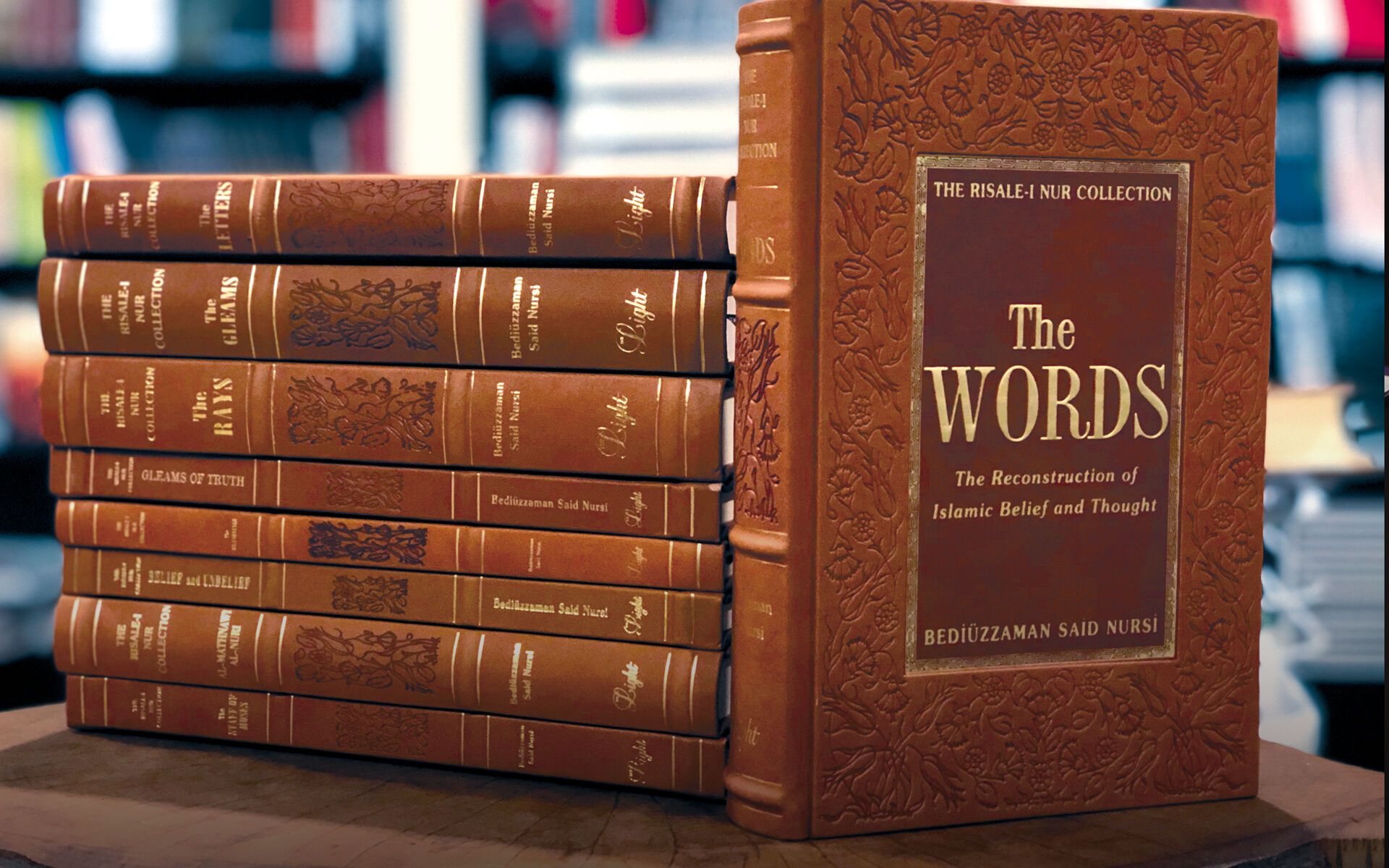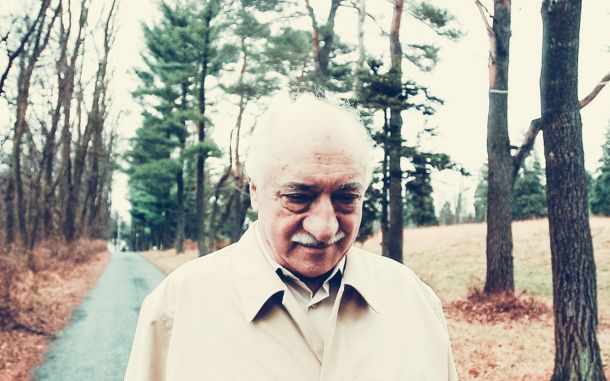The Understanding of “Human”

In This Article
-
Nursi’s profound exposition of the Qur’an allows him to speak about a unique and positive vision of humanity embedded in the inward dimensions of Islamic scripture.
-
According to the Qur’an, any kind of knowledge—even that which angels are granted, or that which humans acquire because of their own intellectual pursuits—is a Divine gift.
-
Humans are seen by Nursi as the fruit of the tree of the Universe (al-Ansari, 106). Had any fruit of any tree become sentient and prostrated itself to its Creator, it would have performed an all-embracing type of worship on behalf of the entire tree.
According to the American Humanist Association, nowadays the word “humanism” is popularly understood to imply “some progressive philosophy of life that, without theism or other supernatural beliefs, affirms our ability and responsibility to lead ethical lives of personal fulfillment” (American Humanist Association). Rarely, if ever, is religion associated with the ideals of humanism. It is even more so in the case of Islam, which after the attacks on September 11 came to be closely associated with “terrorism,” “intolerance,” and “dogmatism” within the modern mind. Most people seem to remain in the dark about the insightful, life-affirming, and broad-minded philosophies developed by modern Islamic thinkers and adopted by millions of Muslims all over the world.
One such thinker is Bediuzzaman Said Nursi (1877-1960), who wrote thousands of pages of Qur’anic commentary collected under the title of the Risale-i Nur (“The Epistles of Light”). The commentary has become the foundation of a number of Turkish-led modern Islamic movements (Mattson 2013, 249). Nursi’s profound exposition of the Qur’an allows him to speak about a unique and positive vision of humanity embedded in the inward dimensions of Islamic scripture. His worldview tends to be all-inclusive, philosophically profound, and featuring the life-affirming concept of “humanity.” While being erected upon Nursi’s firm religious weltanschauung, his philosophy welcomed cultural diversity and highlighted tolerance and forgiveness as sine qua non for the success of any modern Islamic discourse. Hence this paper’s importance: it will highlight the ideas of Nursi that deal with the notion of “humanity” and will thereby show an authentically Islamic vision of humanity. I will explore Nursi’s concept of humanity by showing the way he bases his understanding upon his Qur’anic interpretation. As Nursi scholar Hakan Coruh argues, the exegetical approach of Nursi is rather difficult to classify: while Nursi himself defines his tafsīr as “spiritual” (tafsīr-i ma‘nawī), it is in fact a synthesis of the traditional kalām (speculative theology) and tafsīr, or, in Coruh’s parlance, a kalāmized Qur’anic exegesis (Coruh 2015, 11).
Purposes of Human Life
Bediuzzaman’s understanding of man draws heavily from the Qur’an. The main question that he tries to address is that of the origins and purposes of human life. The answer, he thinks, is provided in chapter 55, verses 1-4: “The Most Compassionate. He has taught the Qur’an. He created humanity. He taught them speech” (Nursi 1994, 23). Indeed, according to Nursi, the Universe—and humans as a part thereof—came to exist through the manifestation of God’s attributes and names, everything therein owing its existence and vitality to Allah. For example, we can see in all animate things His Names “the Ever-Living One” (al-Ḥayy) and “the Giver of Life” (al-Muḥyi); in the universe’s mind-boggling degree of majestic balance, one can contemplate His Name “the Just” (al-‘Adl). Thus, in the Islamic worldview, Allah is not something conflated with the Universe or defined by natural laws; being the sole creator of all and manifesting His names everywhere, He, nonetheless, stands beyond and above Creation: as Nursi says, the Qur’an does not terminate the stable realities of things (Risale-i Nur Enstitusu). In Bediuzzaman’s own analogy, when one stands on the bank of a spring, he can see the sun reflected on the surface of the bubbles of water passing beneath. The “tiny suns” disappear after a short while, as the bubbles burst. The real sun remains intact, of course. This shows that the sun in no way belongs to the bubbles themselves, being everlasting and independent from the existence of the tiny bubbles (Nursi 2008, 296). The same goes for creatures: through their being alive they allude to the Divine and the life of the Divine; through their deaths they disclose His Permanence (al-qayyūmiyyah).
According to the Qur’an, any kind of knowledge—even that which angels are granted, or that which humans acquire because of their own intellectual pursuits—is a Divine gift. As the Qur’an tells us, “They [i.e. angels] said: ‘Glory be to You! We do have no knowledge save what You have taught us. Verily, You are the All-Knowing, All-Wise’” (Q 2:32). Indeed, it was Adam’s ability to grasp the abstract realities of things through naming them that astonished the angels, distinguishing him from the rest of Creation and entitling him to become God’s viceroy on Earth. For Nursi, the divine origin of the Qur’an renders it an unfailing criterion enabling one to distinguish between authentic and inauthentic knowledge (Nursi 1994, 23). Nursi defines the Qur’an as the embodiment of truth. In the book Ishārāt al-I‘jāz fī Maẓann al-Ijāz (“The Indications of Inimitability in the Loci of Apparent Terseness”), the fifth part of his Qur’anic commentary Risale-i Nur (“Epistles of Light”), Nursi defines the Qur’an as follows:
It is the pre-eternal translator of the great book of the universe; the discloser of the treasures of the divine names concealed in the pages of the earth and the heavens; the key to the truths hidden beneath the lines of events; the treasury of the Most Merciful’s favors and of the pre-eternal addresses, which issue forth from the World of the Unseen beyond the veil of this Manifest World; the sun, foundation, and plan of the spiritual world of Islam, and the map of the worlds of the hereafter. (al-Ansari, 253)
Thus, for him, the real source of the most authentic knowledge is the Qur’anic principles themselves, which “confirm each other in respect of humans’ feelings and intellect, blending them in a Qur’anic combination” (Muhsin 2004, 404). Indeed, according to Nursi, humans can hardly balance out the three aspects of their inner nature, namely their powers of appetite, anger and reasoning (Unal 2007, 51). For the purpose of the Divine test, humans were left unrestrained as far as their use of these inward powers is concerned. For instance, humans are seldom successful at getting the power of their anger to revolve around their courage (which is a combination of anger with reasoning), or in keeping their appetite in check with the principles of chastity (which is a combination of appetite with reasoning). Indeed, our intellect does not always ply the pathway of wisdom (i.e. our understanding of our limits), and justice (as the sum total of all virtues) is yet to be fully maintained in our social life. However, without obtaining this balance, humanity’s happiness is well-nigh impossible. Thus, according to Nursi, only the universal, unfailing intellect of God can cater to our quest for happiness by sending us Divine Revelation (Unal 1998, 24).
Divine Names
Nursi is sure to show that the spiritual viceregency (al-khilāfah al-ma‘nawiyyah) was granted to humanity because of their ability to mirror Divine names and attributes: “Man is a well-composed ode of wisdom proclaiming the manifestations of the Sacred Divine Names, and a seed-like self-evident miracle of Divine power containing all the members of an eternal tree (Nursi 2008, 329).” However, this means that the Divine attribute of “Mutakabbir” (supremely proud) is also reflected in humans, transforming into their self-identity and, sometimes, into outright egotism. Hence the Qur’an says, “We offered the Trust to the Heavens and the Earth and the mountains, and they declined to bear its burden and got afraid thereof. However, humans picked it up” (Q 33:72). Ironically, even if humans oftentimes behave as if they were omnipotent, their direct power is confined to the distance of their arms’ length, for everything further stands out of their immediate command. In fact, physically speaking, the human body is quite helpless compared to other animals. Human knowledge always remains partial in comparison with Allah’s: “O humankind, you are the poor [in relation] to Allah” (Q 35:15). Humankind’s possession of anything is always limited, while their needs are unlimited. One’s mind, thanks to its consciousness of the past and future times, can reduce one to the level of a most wretched animal, for it can arouse in one an insatiable anxiety as to how one can meet one’s unlimited needs. According to Nursi, humans’ duty is to deploy their intellect within the guidelines provided by the universal intellect of the Revelation. They must take recourse to the power of God as an intercessor for their helplessness and resort to His boundless knowledge as a remedy for their ignorance (Unal 2007, 51). Thus, humans’ ontological poverty may become a source of their good qualities. Jealousy might transition into one’s emulating or competing with others with the pure intention of doing good, and one’s ambition can turn into one’s persistence in being virtuous (Unal 2007, 61).
According to Nursi, everything in the Heavens and the Earth serves humans. Humans, however, serve nothing of creaturely order, as their sole existential aim is to serve God, as stipulated in the Qur’an: “I (Allah) did not create the jinns and humans except that they should worship Me,” (Q 51:56) and, “It is He Who created for you all that is on earth” (Q 2:29) (Unal 1994, 4). That is to say, humans act as the ruling kings of nature; thanks to their ability to manage things and manipulate them in a way that benefits them, humans are radically different from animals.
Humans are seen by Nursi as the fruit of the tree of the Universe (al-Ansari, 106). Had any fruit of any tree become sentient and prostrated itself to its Creator, it would have performed an all-embracing type of worship on behalf of the entire tree. Therefore, the fruit is the ultimate goal of the tree and the natural outcome of the tree’s life. In the same vein, humans, being the most perfect creatures in the world, are the latter’s fruit and final goal. As a fruit of a tree bears the whole plan of the tree’s life, the fruit of the universe, that is, humans, are a miniature index and quintessence of everything that the universe contains. To put it differently, humans are microcosms, and the universe is a “macrohuman” (Unal 1998, 4). All chemical and physical elements, indeed, life in all its manifestations—animalistic, vegetative, angelic, or diabolic—is present within humans in the same way it is present in the universe. On this point, Scheler was of the same opinion: humans, he thought, bear within themselves the essence of the whole universe (Unal 1998, 4).
Mirror
According to his Qur’anic anthropology, a unique feature Nursi confers on humans is the notion that we are “mirrors of God.” This conclusion proceeds from the following two aspects:
- In the same way that darkness serves as a foil for the beauty of light, the impotence of humans—their weakness, shortcomings, and mistakes—serve as a foil for the power of the All-Powerful, All-Subsistent, and Perfect One to manifest (al-Ansari, 117, 118).
- Being a mirror of the perfect names of Allah and not the authentic possessor thereof, humans fail to manifest the Divine names and attributes in full. Their partial manifestation within humans is rather meant to highlight the existence of the corresponding names and attributes of Allah, ones that are all-embracing and universal (al-Ansari, 115).
Thus, humans’ lofty attributes serve the mission of being measurement units of the corresponding lofty attributes of the Divine. To put it differently, humanity’s partial and incomplete ability to comprehend the names and attributes of Allah gives it some idea about the unlimited, absolute nature of those names and attributes by the power of contrast. Also, even as far as their physical appearance is concerned, humans are beautiful mirrors of the Divine names and attributes (for instance, their faces are the proof of the inimitable and beautiful creative act) (al-Ansari, 115).
Even if humans have the nominal ability to create and manage, Nursi maintains, it is Allah who remains the real creator of everything and its sole manager. Verily, if other creatures “bow” in their servitude to humans, they do so only because Allah meant them to do so and because this “bowing” is their own, unique way of worshipping Allah. This is reflected in the Qur’anic verse “And to Allah prostrates all those within the heavens and the earth, willingly or by compulsion, as do their shadows in the mornings and in the evenings” (Q 13:15).
Dialogue
Another central feature of Nursi is the openness of his philosophy toward dialogue with alternative religious worldviews, especially with that of Christianity. As Ian Markham, a scholar of Nursi’s work, points out, “…Said Nursi is properly labelled an ‘inclusivist.’ He is committed to the truth of Islam… Yet he acknowledges that other traditions have a partial insight into the truth” (Markham 2004, 18). The value that Bediuzzaman placed on dialogue can be understood if we attend to his account of creation. For him everything in the world is intelligible and dialogic, as all entities—different as they might be in appearance—are essentially beautiful mirrors of God requiring that observers appreciate them. As Nursi says in his magnum opus, The Words: “Beauty and fairness desire to see and be seen. Both of these require the existence of yearning witnesses and bewildered admirers” (Nursi 2008, 80). During his lifetime, he several times reached out to Christian leaders, the most important instances being his sending his works to Pope Pius XII in 1950 and the visit that he paid to the Ecumenical Patriarch Athenagoras in Istanbul in 1953. His intention was to invite Muslims and Christians to cooperate against their common existential enemy, atheism (Michel 2005a, 36). According to Nursi, the verse Q 5:51 that calls Muslims “not to take the Jews and the Christians for your friends” is only applicable when the Jews and the Christians demonstrate qualities of disbelief and impiety—and not when they are pious followers of their religion. He also points out that the aforementioned verse should be interpreted within the more general context of Islamic Law. The very fact that Islamic law allows Muslim men to marry Jewish and Christian women suggests for Nursi that, if this profound relationship is allowed, so is friendship between the communities. Most naturally, the spouses will reciprocate love and compassion and will become intimate friends (Michel 2005b, 37). Nursi also found another reason to entertain dialogic relations with Christianity. That is, a Prophetic tradition predicts that, when the end of time will draw close, God-mindful Christians will swell the ranks of Muslims to fight their common adversary—atheism (Michel 2005b, 20). Indeed, the ideological opposition envisaged by Nursi is not against Christianity. Rather, it is against those elements of Western civilization that are alien to the spirit of what he believed to be true Christianity and that are focused on the anthropocentrism of Greco-Roman philosophical thought, which absolutized the human person and marginalized God (Michel 2005a, 29).
All in all, Nursi’s approach to humanity is informed by his unique interpretation of the Qur’an. Well-trained in the ways of modern philosophy and steeped in his own Islamic tradition, he spoke about some sort of theocentric humanism, in which one’s devotion to God necessitates one’s unconditional love for human beings as God’s best creatures to mirror His names and attributes. His is unique Qur’anic philosophy which endeavors to capture the very essence of being while remaining informed by the Qur’anic outlook. According to Nursi, those steeped in philosophy alone “consciously walk along dead end streets or through such labyrinths wherein finding the way becomes increasingly difficult” (Unal 2007, 66). In his sight, philosophy unaided by revelatory truths is too vague, convoluted, and idiosyncratic. As for his Qur’anic approach, it flaunts realism and objectivity. Based on centuries-old Islamic tradition, it proffers criteria that can be easily practiced. Finally, based on its notion of humans as the best pattern of God’s creation, the Scripture-based philosophy of Nursi envisages open-mindedness to other worldviews and is intrinsically inclusive—something that should be celebrated in our divided contemporary world.
References
- al-Ansari, Farid. Miftāḥ al-Nūr fī Mafāhīm Rasā’il al-Nūr (Miknas: Jami‘at al-Sulṭān al-Mawlā Ismā‘īl), 253, Kindle.
- “Are You Humanist?” American Humanist Association, http:///americanhumanist .org (accessed on Nov 19, 2019).
- Coruh, Hakan. “Bediuzzaman Said Nursi and his understanding of exegesis in his Risale-i-Nur,” (PhD diss., Australian Catholic University, 2015), 11, ACU Research Bank.
- Markham, Ian. “Truth and Toleration: The Said Nursi Achievement,” in Bringing Faith, Meaning & Peace to Life in a Multicultural World: The Risale-i Nur Approach (Istanbul: Nesil, 2004), 18.
- Ingrid Mattson, The Story of the Qur’an: Its History and Place in Muslim Life, (Chichester: Wiley-Blackwell, 2013), 249.
- Michel, Thomas. “Muslim-Christian Dialogue and Cooperation in the Thought of Bediuzzaman Said Nursi,” in Said Nursi’s Views on Muslim-Christian Understanding, ed. Shukran Vahide (Istanbul: Soz Basim Yayin, 2005a), 36.
- Michel, Thomas. “Nursi’s View of Tolerance, Engagement with the Other, and the Future of Dialogue,” in Said Nursi’s Views on Muslim-Christian Understanding, ed. Shukran Vahide (Istanbul: Soz Basim Yayin, 2005b), 20.
- Muhsin, “‘Abd al-Hamid. The Theory of Knowledge in the Qur’an according to the Risale-i Nur,” in A Contemporary Approach to Understanding the Qur’an. The Example of the Risale-i Nur, ed. Abdullah Varlik (Istanbul: Sozler Publications, 2004), 404.
- Nursi, Bediuzzaman Said. The Words: On the Nature and Purposes of Man, Life, and All Things, (Istanbul: Sozler Publications) 2008, 296.
- Nursi, Bediuzzaman Said. “Ishārāt al-I‘jāz fī Maẓann al-Ijāz,” in Kulliyat Rasa’il al-Nur 5, trans. Ihsan Qasim al-Salih (Beirut: Nur, 1994), 23.
- Risale-i Nur Enstitusu, “’Her Sey O’ Mudur, Yoksa ‘Her Sey O’ndan’ Midir?” Sorularla Said Nursi, http://www.sorularlasaidnursi.com/her-sey-o-mudur-yoksa-her-sey-ondan-midir (accessed on Nov 19, 2019).
- Unal, Ali. Islamic Perspectives on Science: Knowledge and Responsibility (New Jersey: Light), 2007, 51.
- Unal, Ali. “Kant, Scheler and Bediuzzaman on Man,” Fountain Magazine 24, no. 4 (October-December 1998), https://fountainmagazine.com/1998/issue-24-october-december-1998/kant-scheler-and-bediuzzaman-on-man (accessed on Nov 17, 2019).









